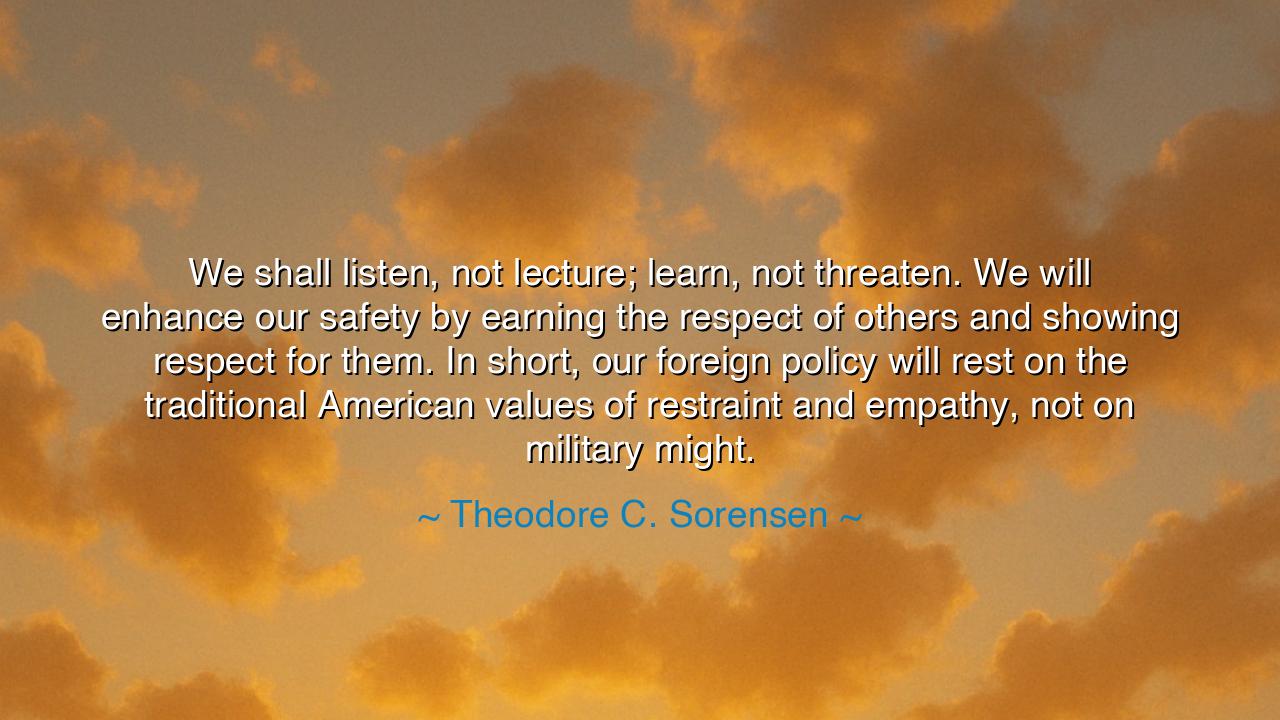
We shall listen, not lecture; learn, not threaten. We will
We shall listen, not lecture; learn, not threaten. We will enhance our safety by earning the respect of others and showing respect for them. In short, our foreign policy will rest on the traditional American values of restraint and empathy, not on military might.






Hear then the words of Theodore C. Sorensen: “We shall listen, not lecture; learn, not threaten. We will enhance our safety by earning the respect of others and showing respect for them. In short, our foreign policy will rest on the traditional American values of restraint and empathy, not on military might.” These words shine like a lamp against the storm of conflict, reminding us that true power is not born of threats, nor is honor upheld by weapons, but by listening, by empathy, and by the rare wisdom of restraint.
In ages long past, the strongest nations often mistook domination for destiny. Armies marched, cities burned, and empires rose high only to collapse under the weight of their own cruelty. Sorensen, counselor to a president, spoke against this ancient folly. He called forth a vision where the shield is not iron, but respect; where the fortress is not stone, but trust between peoples. To listen instead of lecture is to disarm pride; to learn instead of threaten is to walk a higher road, where dialogue becomes the true safeguard of nations.
Let us recall the tale of Cyrus the Great, founder of the Persian Empire. Unlike many conquerors, he was revered not only for victories, but for his justice and mercy. When he took Babylon, he did not destroy it, nor enslave its people. Instead, he freed the captives, restored their temples, and allowed them to live by their own customs. His rule endured because it rested not solely on the sword, but on restraint and empathy. In this, Sorensen’s words echo an ancient truth: that the hearts of men are not won by fear, but by fairness.
Sorensen’s warning is also a mirror held up to our own time. How often do nations fall into the trap of equating safety with armament, and influence with intimidation? Yet each missile launched sows bitterness, each insult hurled plants distrust. Safety, he declares, is not secured by towering walls nor by legions of soldiers, but by earning respect. For respect breeds friendship, and friendship breeds peace. No empire can stand forever on terror, but many a humble alliance has endured through mutual trust.
The essence of this teaching is not confined to the grand stage of nations. It speaks to every hearth, every family, every community. In our own lives, do we not find that harmony comes not when we raise our voices, but when we listen? Do we not discover that bonds strengthen not through threats, but through understanding? The same law that governs nations governs households: restraint tempers anger, empathy heals wounds, and respect for others creates a shield that no force can easily pierce.
The lesson, then, is plain yet profound: wield not the clenched fist, but the open hand. Respect is the true armor of the wise, and empathy the truest weapon of the just. Let each person practice these values in the smallest acts: hear before speaking, seek to understand before condemning, and show patience where anger might rise. For when we live this way, we become ambassadors of peace, not only between nations, but in every place where human hearts meet.
Know also that this path is not weakness, but the highest form of strength. To restrain the impulse to dominate, to choose humility over arrogance, requires greater courage than any battlefield conquest. The heroes of peace may not be adorned with medals, yet their legacy endures long after armies have turned to dust. Sorensen, like the sages of old, bids us remember: the mightiest victories are won not by force, but by restraint and empathy.
Therefore, O listener, take these words into your spirit. Teach them to your children, practice them with your neighbors, carry them into the world. For the day will come when each of us must decide: shall we lecture or listen, shall we threaten or learn? Choose the higher way, and you will find that peace follows you as faithfully as a shadow in the sun.






AAdministratorAdministrator
Welcome, honored guests. Please leave a comment, we will respond soon